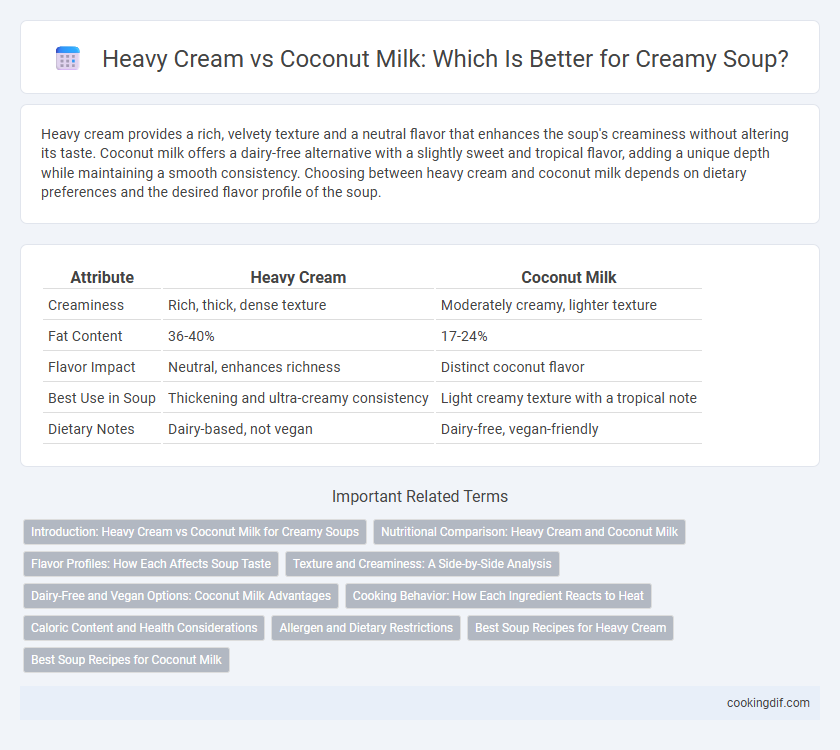Heavy cream provides a rich, velvety texture and a neutral flavor that enhances the soup's creaminess without altering its taste. Coconut milk offers a dairy-free alternative with a slightly sweet and tropical flavor, adding a unique depth while maintaining a smooth consistency. Choosing between heavy cream and coconut milk depends on dietary preferences and the desired flavor profile of the soup.
Table of Comparison
| Attribute | Heavy Cream | Coconut Milk |
|---|---|---|
| Creaminess | Rich, thick, dense texture | Moderately creamy, lighter texture |
| Fat Content | 36-40% | 17-24% |
| Flavor Impact | Neutral, enhances richness | Distinct coconut flavor |
| Best Use in Soup | Thickening and ultra-creamy consistency | Light creamy texture with a tropical note |
| Dietary Notes | Dairy-based, not vegan | Dairy-free, vegan-friendly |
Introduction: Heavy Cream vs Coconut Milk for Creamy Soups
Heavy cream delivers a rich, silky texture and a high fat content of about 36-40%, making it ideal for ultra-creamy soups like bisques and chowders. Coconut milk, with its natural creaminess and a fat content ranging from 17-24%, offers a dairy-free alternative that imparts a subtle sweetness and tropical flavor, perfect for vegan or lactose-intolerant diets. Choosing between heavy cream and coconut milk depends on dietary preferences, desired flavor profiles, and nutritional goals in creamy soup recipes.
Nutritional Comparison: Heavy Cream and Coconut Milk
Heavy cream offers a higher fat content, typically around 36-40%, providing superior creaminess and richness to soups while delivering approximately 52 calories and 5.5 grams of fat per tablespoon. Coconut milk contains around 17-24% fat, with about 45 calories and 4.5 grams of fat per tablespoon, making it a lower-fat, dairy-free alternative rich in medium-chain triglycerides (MCTs) that may support metabolism. Nutritionally, heavy cream is richer in saturated fats and cholesterol, whereas coconut milk is cholesterol-free and includes nutrients like manganese and iron, making the choice dependent on dietary preferences and restrictions.
Flavor Profiles: How Each Affects Soup Taste
Heavy cream imparts a rich, velvety texture with a subtly sweet, dairy flavor that enhances the soup's depth and smoothness. Coconut milk introduces a creamy consistency balanced by a distinct, slightly sweet and nutty tropical flavor, adding an exotic twist to savory dishes. Selecting between heavy cream and coconut milk depends on the desired flavor profile, with heavy cream offering traditional richness and coconut milk providing a unique, fragrant undertone.
Texture and Creaminess: A Side-by-Side Analysis
Heavy cream delivers a rich, velvety texture with a high fat content, making soups luxuriously smooth and thick. Coconut milk offers a lighter, slightly thinner consistency with a subtle sweetness, providing creaminess without the dairy richness. For ultimate silkiness in soups, heavy cream remains superior, while coconut milk serves as a dairy-free alternative that enhances texture with a tropical flavor profile.
Dairy-Free and Vegan Options: Coconut Milk Advantages
Coconut milk provides a rich, naturally creamy texture that enhances soup recipes while maintaining a dairy-free and vegan profile. Its high fat content mimics the mouthfeel of heavy cream without the lactose or cholesterol, making it ideal for those with dietary restrictions or preferences. Using coconut milk also imparts subtle sweetness and tropical notes, offering a flavorful alternative to traditional cream-based soups.
Cooking Behavior: How Each Ingredient Reacts to Heat
Heavy cream thickens and enriches soup with a smooth, velvety texture as it heats, maintaining its stability without curdling even at high temperatures. Coconut milk, while also creamy, can separate or curdle if exposed to prolonged boiling or high heat, as its fat content reacts differently under heat, requiring gentle simmering to preserve its consistency. Choosing between heavy cream and coconut milk depends on the desired flavor profile and the soup's cooking method, with heavy cream preferred for stable, rich thickening and coconut milk favored for dairy-free, tropical-infused dishes.
Caloric Content and Health Considerations
Heavy cream provides a rich, velvety texture to soups with approximately 52 calories per tablespoon and high saturated fat content, which may impact cardiovascular health if consumed in excess. Coconut milk offers a dairy-free alternative with around 45 calories per tablespoon, containing medium-chain triglycerides that can boost metabolism but also carry significant saturated fats. Choosing between heavy cream and coconut milk depends on dietary preferences, calorie goals, and potential allergies or intolerances.
Allergen and Dietary Restrictions
Heavy cream offers rich creaminess ideal for soups but contains dairy, posing allergen risks for those with lactose intolerance or milk allergies. Coconut milk provides a creamy texture while being dairy-free and suitable for vegan, lactose-intolerant, and nut-free diets, making it an allergen-friendly alternative. Choosing between the two depends on dietary restrictions and desired flavor profiles, with coconut milk often preferred for hypoallergenic and plant-based needs.
Best Soup Recipes for Heavy Cream
Heavy cream provides a rich, velvety texture and deep creaminess that enhances the flavor and mouthfeel of many soup recipes, such as classic clam chowder and creamy tomato bisque. Its high fat content creates a smooth, indulgent consistency that coconut milk often cannot replicate, especially in dairy-based soups. For the best soup recipes that rely on heavy cream, dishes like lobster bisque, creamy mushroom soup, and potato leek soup achieve a luxurious depth and richness that highlights heavy cream's superior thickening and flavor-enhancing properties.
Best Soup Recipes for Coconut Milk
Coconut milk provides a rich, naturally creamy texture and a subtle, slightly sweet flavor ideal for tropical and Asian-inspired soups, making it a popular choice in recipes like Thai coconut curry soup and creamy pumpkin coconut soup. Heavy cream offers a thicker, more neutral creaminess that enhances classic soups such as clam chowder and creamy mushroom soup without altering the base flavor. For those seeking dairy-free or vegan alternatives in the best soup recipes, coconut milk delivers both creaminess and a unique depth of taste that heavy cream cannot replicate.
Heavy Cream vs Coconut Milk for creaminess Infographic

 cookingdif.com
cookingdif.com